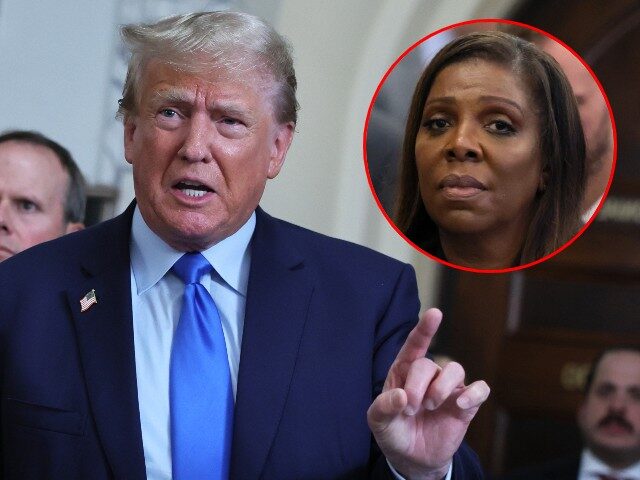New York Attorney General Letitia James reportedly has three ways to collect $454 million if former President Donald Trump does not post a bond to cover a civil fraud judgment by Monday.
If Trump’s Monday appeal fails to reduce or hold off James from collecting the bond amount, she would have the power to go after the former president’s cash and real estate holdings. “We are prepared to make sure that the judgment is paid to New Yorkers,” James told ABC News in February.
To stave off James’ tactics, Trump must post a liquid (cash, securities) bond covering the full amount of the judgment to pause enforcement of the judgment, but 30 surety companies told Trump they would not accept real estate assets as collateral, his lawyers said Monday.
Trump maintains the legal action against him is election interference. “Judge Engoron actually wants me to put up Hundreds of Millions of Dollars for the Right to Appeal his ridiculous decision,” Trump posted on Truth Social Tuesday. “In other words, he is trying to take my Appellate Rights away from me when I have already won at the Appellate Division, but he refuses to accept their already made decision.”
Nevertheless, James might be in the position to collect the grand sum by three methods, USA Today reported:
- Placing liens against properties
- Collecting rents from properties
- Collecting funds from Trump’s New York state bank accounts
“There’s a lot that you can do here in New York,” Mitchell Epner, a long-time New York litigator, told USA Today. “It’s not just limited to real estate.”
Epner said James would likely first go after cash in Trump’s New York banks accounts, second property that isn’t real estate, and third real estate. “If there are bank accounts in New York, those can be frozen essentially immediately if she already knows where they are, and the turnover of the funds in a bank account would be measured in days or weeks,” Epner said.
Concerning real estate, Nager said the judgment would become a lien against Trump’s Manhattan properties due to their location in New York County, where James won in court. “For instance, if the Trump Organization — which is one of the Trump entities subject to the judgment — owns a property in Manhattan with tenants who pay rent, you can have their rental payments redirected,” USA Today reported.
James could then use the judgment to target Trump’s assets in other states through a process called “domesticating.” “The courts of the other 49 states and the District of Columbia don’t really have discretion about whether or not to allow the New York judgment to be domesticated in that state, because the Constitution has something called the Full Faith and Credit Clause, which requires each state to give full faith and credit to the judgment of the other states,” Epner said.
If James is successful in seizing the properties, James could sell the real estate at auction below market value. “The problem is that the properties might be sold, so he might be able to recover a money judgment for the value of the property, but that’s not what he wants, he doesn’t really want to have the property dismantled,” Director of the Center for Real Estate Law & Policy at the Cardozo School of Law Stewart Sterk told USA Today.
Constitutional scholar Jonathan Turley believes Trump’s predicament is a form of “mob justice” that could ultimately find its way to the Supreme Court:
His position is in order to get any other judge to look at what I’ve done to you, you’ve got to come up with basically a half a billion dollars just to appeal. It’s like a judge saying, “I’m going to take your house away, but you can appeal my decision. You just have to sell your house in order to do it.” …[M]any people look at this as a type of almost mob justice.
And this could end up going beyond the New York system. They [Trump’s team] could appeal this all the way to the Supreme Court. On occasion, the Supreme Court has intervened in state actions, for example, on punitive damages, and so that points damages can become so high they deny someone due process of law. This is falling into that extreme category, in my view. I find it appalling.
“It shocks the conscience that you have to pony up this type of money just to get someone to look at what you believe, and I believe, is an excessive ruling by this judge,” Turley concluded.
Wendell Husebo is a political reporter with Breitbart News and a former GOP War Room Analyst. He is the author of Politics of Slave Morality. Follow Wendell on “X” @WendellHusebø or on Truth Social @WendellHusebo.

COMMENTS
Please let us know if you're having issues with commenting.